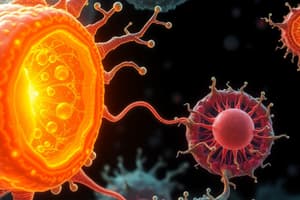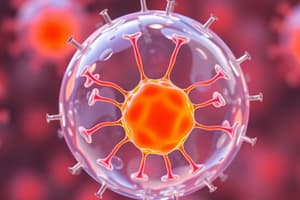Podcast
Questions and Answers
What type of adaptation involves changes in cell shape or size?
What type of adaptation involves changes in cell shape or size?
- Functional adaptation
- Structural adaptation (correct)
- Gene expression
- Biochemical adaptation
Which mechanism of cell adaptation involves changes in genetic expression without altering the DNA sequence?
Which mechanism of cell adaptation involves changes in genetic expression without altering the DNA sequence?
- Cell signaling
- Epigenetic modifications (correct)
- Cellular differentiation
- Gene expression
How do nerve cells adapt in response to learning and memory?
How do nerve cells adapt in response to learning and memory?
- Reduction in synapses formed
- Increase in number of synapses (correct)
- Decreased neural activity
- Decrease in the size of cell body
Which of the following is NOT a common example of cell adaptation?
Which of the following is NOT a common example of cell adaptation?
What is a primary role of hormonal and growth factor regulation in cell adaptation?
What is a primary role of hormonal and growth factor regulation in cell adaptation?
Which type of adaptation includes changes in cellular metabolism or enzymatic activity?
Which type of adaptation includes changes in cellular metabolism or enzymatic activity?
What is the significance of cell adaptation in the context of tissue repair?
What is the significance of cell adaptation in the context of tissue repair?
Which of the following is an example of structural adaptation in muscle cells?
Which of the following is an example of structural adaptation in muscle cells?
What defines functional adaptation in cells?
What defines functional adaptation in cells?
Which environmental cue is least likely to regulate cell adaptation?
Which environmental cue is least likely to regulate cell adaptation?
Flashcards are hidden until you start studying
Study Notes
Cell Adaptation
Cell adaptation refers to the ability of cells to change their structure, function, or behavior in response to changes in their environment.
Types of Cell Adaptation
- Structural adaptation: Changes in cell shape or size to improve function.
- Functional adaptation: Changes in cell behavior or physiology to improve function.
- Biochemical adaptation: Changes in cellular metabolism or enzymatic activity to improve function.
Mechanisms of Cell Adaptation
- Gene expression: Changes in gene transcription and translation to produce new proteins.
- Epigenetic modifications: Changes in gene expression without altering the DNA sequence.
- Cell signaling: Changes in signaling pathways to respond to environmental cues.
- Cellular differentiation: Changes in cell type or function in response to environmental cues.
Examples of Cell Adaptation
- Muscle cells: Increase in size and number of myofibrils in response to exercise.
- Nerve cells: Increase in number of synapses and strengthening of neural connections in response to learning and memory.
- Epithelial cells: Change in cell shape and tight junction formation in response to changes in osmotic pressure.
Importance of Cell Adaptation
- Survival and growth: Cells adapt to changing environments to survive and grow.
- Development and differentiation: Cells adapt to form different tissues and organs during development.
- Disease and injury: Cells adapt to respond to disease and injury, leading to tissue repair and regeneration.
Regulation of Cell Adaptation
- Hormonal regulation: Hormones regulate cell adaptation through signaling pathways.
- Growth factor regulation: Growth factors regulate cell adaptation through signaling pathways.
- Environmental cues: Environmental cues, such as temperature and pH, regulate cell adaptation.
Cell Adaptation
- Cell adaptation is the ability of cells to change their structure, function, or behavior in response to environmental changes.
Types of Cell Adaptation
- Cells can adapt through structural changes, such as changes in shape or size, to improve function.
- Functional adaptation involves changes in cell behavior or physiology to improve function.
- Biochemical adaptation involves changes in cellular metabolism or enzymatic activity to improve function.
Mechanisms of Cell Adaptation
- Gene expression involves changes in gene transcription and translation to produce new proteins.
- Epigenetic modifications involve changes in gene expression without altering the DNA sequence.
- Cell signaling involves changes in signaling pathways to respond to environmental cues.
- Cellular differentiation involves changes in cell type or function in response to environmental cues.
Examples of Cell Adaptation
- Muscle cells increase in size and number of myofibrils in response to exercise.
- Nerve cells increase in number of synapses and strengthen neural connections in response to learning and memory.
- Epithelial cells change shape and form tight junctions in response to changes in osmotic pressure.
Importance of Cell Adaptation
- Cell adaptation is crucial for survival and growth, as cells adapt to changing environments.
- Cell adaptation plays a role in development and differentiation, as cells form different tissues and organs.
- Cell adaptation helps respond to disease and injury, leading to tissue repair and regeneration.
Regulation of Cell Adaptation
- Hormones regulate cell adaptation through signaling pathways.
- Growth factors regulate cell adaptation through signaling pathways.
- Environmental cues, such as temperature and pH, regulate cell adaptation.
Studying That Suits You
Use AI to generate personalized quizzes and flashcards to suit your learning preferences.




